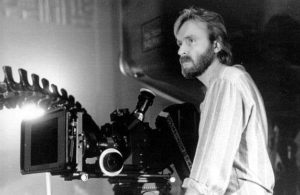
James Cameron has written & directed 3 of the top 4 highest-grossing movies of all time (Avatar, Avatar: The Way of Water, and Titanic).
Before he made movies, Cameron was a truck driver.
He didn’t go to film school.
Instead, on the weekends, he would go to the library and..
“I’d pull any thesis that [University of Southern California] graduate students had written [on] anything that related to film technology,” Cameron explained.
“And for the cost of xeroxing (photocopying), I [got] all these doctoral dissertations [and] build up these big binders on how everything was done.”
“So I literally gave myself a full graduate course on film technology for about $120.
I didn’t have to enroll in school because it was all there in the library. I’d set it up to go in like I was on a tactical mission, find out what I needed to know, and take it all home.”
Takeaway 1:
When asked what motivated him to read those big binders full of information on filmmaking, Cameron said he was just following what excited him.
“People seek out the information and knowledge they need,” he said. “It’s like a divining rod.”
The mythologist Joseph Campbell similarly talked about how reading is like “a divining rod,” a way to find what you are uniquely attracted to and meant to do.
“You’ve got to read,” Campbell said. “Find [what] excites you. And if it doesn’t excite you…It’s not yours.”
Takeaway 2:
Of course, at some point, Cameron had to put the binders down and pick up a camera.
When he eventually attempted to make his first movie, Cameron said, “It was a bit like a doctor doing his first appendectomy after having only read about it.”
The bestselling author and learning expert, Scott Young, has a great article with a great title, “Do The Real Thing.”
“When you examine case studies of people who have had major accomplishments,” Scott writes, “you expect there to be some trick or shortcut…More often, however, the strategy used is dead simple: doing the real thing.”
Takeaway 3:
Leonardo da Vinci used to sign off his letters, “Leonardo da Vinci, disscepolo della sperientia” (“disciple of experience”).
He used to believe that one learns best by solely “doing the real thing.”
Over time, however, he evolved out of this belief and, biographer Walter Isaacson writes, “became a disciple of both experience and received wisdom.”
When you examine case studies of people who have mastered their craft, you usually find they are “disciples of both experience and received wisdom.”
Like Cameron, they read the library and they do the real thing.
“Those who are in love with practice without theoretical knowledge are like the sailor who goes onto a ship without rudder or compass and who never can be certain whither he is going.” — Leonardo da Vinci
Written by Billy Oppenheimer
